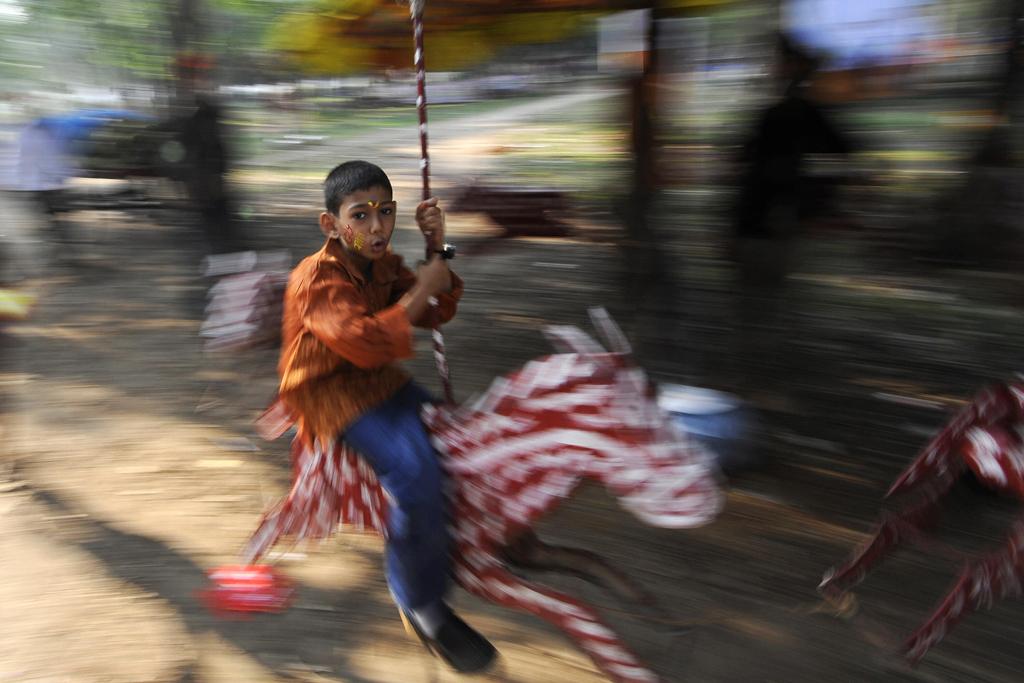India’s aid money-go-round
A Bangladeshi child rides on a merry-go-round.
NEW DELHI, India — A few weeks before Bill Gates and Warren Buffett brought their Giving Pledge road show to India in an effort to persuade the country's budding billionaires to donate more to charity, state donors in countries like the United Kingdom engaged in a spirited debate.
The question: With an economic boom and rising ambition turning India itself into a donor nation, does it still make sense for more developed countries to keep shoveling dollars its way?
There's two sides to the story, of course.
Despite its rapid economic growth, India is still battling poverty and disease on a massive scale, thanks to its huge population. And the new prosperity is not trickling down fast enough to warrant much celebration among its millions of rural farmers.
But too much money to spend can be a bad thing, too. According to a recent report by India's Comptroller and Auditor General, the government failed to spend some $20 billion in foreign aid last year thanks to problems rolling out public works programs — which meant foreign funding actually cost India about $20 million in penalties.
It's not that the money wasn't needed. According to the report, the unspent funds were intended for some 16 areas where India faces acute problems — including some $5 billion allotted for urban development, $2.5 billion for building roads, $2 billion for agriculture and rural development and $2 billion for improving water supply and sanitation.
In its characteristically dry style, the audit office blamed "inadequate planning" for the failure, hinting obliquely at the country's notorious bureaucratic sloth. (Project delays in general will cost India some $28 billion this year, equal to a third of total government spending.)
But even as the large-scale projects funded by agencies like the Asian Development Bank and the World Bank languish and penalties mount for unspent loans, nonprofits on the front lines of India's battle against poverty say that the country's efforts to project itself as a newly arrived economic power have hurt their ability to raise money.
"If you go to the West or other countries, you will see all the news about Indians on the Forbes list and the IT boom and all the good news about India," said Anand Joshua, marketing head of World Vision India. "But the other side of India, the India that is languishing, that news is not there overseas."
It's not only media perception. India may have been the world's largest recipient of foreign aid back in the 1980s, but these days New Delhi has been steadily reducing the number of countries from which it will accept bilateral aid.
India has also been spending aggressively in neighboring nations like Afghanistan, where it is the fifth largest aid donor — as well as Africa, where it has dramatically stepped up aid to compete with China. International aid agencies have taken note.
Earlier this year, the U.K.'s Department for International Development made waves with the announcement that it would freeze bilateral funding for projects in India at 280 million pounds a year until 2015, shifting focus to the poorest areas of the country and moving to tie up with private companies to fund projects. But it was hardly alone. According to the United States Agency for International Development (USAID), American economic assistance to India fell from about $175 million in 2006 to about $130 million in 2009. And the Netherlands has also reduced funding for India-based aid projects dramatically.
As a result organizations like Oxfam India are facing a "severe funding crisis," according to local press reports. The Times of India recently reported that Oxfam India has less than a third of the funds it would normally expect for the year, and Netherlands-based Hivos is coping with a 40 percent cut in its India budget. Meanwhile World Vision India's Joshua said his organization had to scale back its plans by 30 percent this year due to funding constraints.
"Now when foreign donors come to India they say you have enough wealth in India to take care of your own poor," Joshua said.
The government's miserable failure to spend the aid it already receives will make it even harder to convince them to open their wallets.
The article you just read is free because dedicated readers and listeners like you chose to support our nonprofit newsroom. Our team works tirelessly to ensure you hear the latest in international, human-centered reporting every weekday. But our work would not be possible without you. We need your help.
Make a gift today to help us reach our $25,000 goal and keep The World going strong. Every gift will get us one step closer.
